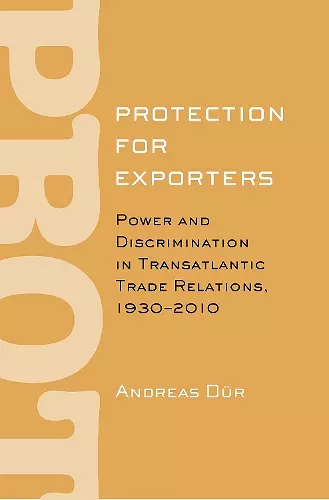Protection for Exporters
Power and Discrimination in Transatlantic Trade Relations, 1930–2010
Format:Hardback
Publisher:Cornell University Press
Published:15th Feb '10
Currently unavailable, and unfortunately no date known when it will be back

The liberalization of transatlantic trade relations since the Great Depression is one of the key developments in the global political economy of the last hundred years. This period has seen the negotiated reduction of both tariffs and nontariff barriers among developed countries, which allowed for the rapid expansion of trade flows, a driving force of economic globalization. In Protection for Exporters, Andreas Dür provides a novel explanation for this phenomenon that stresses the role of societal interests in shaping trade politics. He argues that exporters lobby more in reaction to losses of foreign market access than in pursuit of opportunities, thus providing a rationale for periods of acceleration and slowdown in the pace of liberalization. Dür also presents hypotheses about the form in which protection for exporters is provided (preferential or nonpreferential) and the balance of concessions that is exchanged in trade negotiations.
Protection for Exporters includes case studies of major developments in international trade relations, such as the passage of the Reciprocal Trade Agreements Act in the 1930s, the creation of the General Agreement on Tariffs and Trade in the 1940s, the Kennedy Round in the 1960s, the debate over Fortress Europe in the 1980s, and U.S.-European competition over access to emerging markets in the early 2000s. Dür's rigorous argument and systematic empirical analyses not only explain transatlantic trade relations but also allow for a better understanding of the dynamics of international economic relations.
"In this well-argued and provocative new book, Andreas Dür posits a new argument as to why the United States and the European Community have focused on preferential trade agreements. He believes policymakers negotiate these agreements as a means of protecting their exporters and maximizing their bargaining power. Using empirical and qualitative analysis, Dür forces us to rethink why these trade agreements have proliferated. Trade scholars will be discussing this book extensively in the years to come."—Susan Ariel Aaronson, Research Associate Professor and 2009 Policy Research Scholar, George Washington University
"All those interested in the politics of EU and U.S. trade policy and negotiations will want to keep up with the work of Andreas Dür. He has new and interesting things to say about this much-studied subject."—John S. Odell, Professor and Director, School of International Relations, University of Southern California
"Protection for Exporters is a must-read for anyone interested in the politics of trade policy in a highly interdependent world. This book goes beyond existing accounts of U.S. trade policy and develops an original argument backed by a comprehensive empirical evaluation. Andreas Dür shows how trade policy liberalization since 1945 has been driven by fears of discrimination in foreign markets and the need for governments to protect exporters."—Cédric Dupont, Graduate Institute of International and Development Studies, Geneva
"Protection for Exporters is an innovative and solid contribution to the literature on interstate trade relations. By provocatively challenging the by-now axiomatic understandings of the possibility for collective action and showing the conditions under which exporters, too, would mobilize, Andreas Dür offers a refreshing new explanation for shifts in international trade policies."—Nitsan Chorev, Brown University
"In Protection for Exporters, Andreas Dür argues that exporter lobbying against foreign discrimination provides an important motivation for reciprocal trade liberalization on both sides of the Atlantic. His results will be interesting not only to political scientists but also to economists who study preferential trading areas and global cooperation."—Robert Pahre, Director, European Union Center, and Professor of Political Science at the University of Illinois Urbana-Champaign
ISBN: 9780801448232
Dimensions: 235mm x 155mm x 22mm
Weight: 907g
264 pages